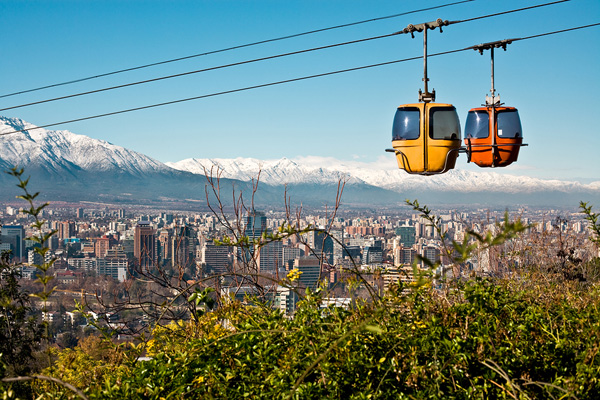Retire in Santiago Guide
Summary: Retire in Santiago with confidence, armed with the knowledge from our extensive guide. It covers critical considerations for retirees, from the cost of living and climate to housing, healthcare, and residency choices in Santiago. We also delve into the social and cultural scene, volunteering options, public transportation facilities, and the city's walkability, helping you make an informed decision.

Santiago, is a popular destination for international retirees due to its vibrant culture, beautiful landscapes, and affordable cost of living. The city offers a unique blend of urban sophistication and outdoor adventures, with a rich history and a welcoming local community. However, like any foreign country, it also presents its own set of challenges, from language barriers to navigating the healthcare system. This article will delve into the various aspects of retiring in Santiago, Chile, providing a comprehensive guide for those considering this South American gem as their retirement destination.
Cost of Living
One of the main attractions of Santiago for retirees is its affordable cost of living. While it's not the cheapest city in South America, it offers a high standard of living at a fraction of the cost compared to many Western countries. Rent, groceries, and utilities are all significantly cheaper, allowing retirees to enjoy a comfortable lifestyle without breaking the bank.
Climate
Santiago boasts a Mediterranean climate, with hot, dry summers and mild, rainy winters. The city enjoys plenty of sunshine throughout the year, making it an ideal location for outdoor enthusiasts. However, air pollution can be a concern, particularly during the winter months.
Healthcare
Chile has a high standard of healthcare, with Santiago home to some of the country's best hospitals and doctors. Both public and private healthcare options are available, providing a range of choices for retirees.
Public Healthcare System
While foreigners are eligible to enroll in the public healthcare system, many choose to opt for private health insurance due to the long waiting times associated with public healthcare. However, the public healthcare system is generally considered to be of good quality and is a viable option for those on a tight budget.
Residency Options for Retirees
Chile offers a retirement visa, known as the "retiree and relative visa", which allows retirees to live in the country permanently. The process is relatively straightforward, although it does require proof of a steady income.
Parks and Recreational Activities
Santiago is surrounded by nature, with the Andes Mountains to the east and the Pacific Ocean to the west. The city itself is home to numerous parks, including the stunning Parque Metropolitano. For those who enjoy hiking, skiing, or simply soaking up the scenery, Santiago has plenty to offer.
Restaurants
Food lovers will be spoilt for choice in Santiago, with a wide range of restaurants serving both local and international cuisine. Some popular options include Bocanáriz, a wine bar and restaurant known for its extensive selection of Chilean wines, and Liguria, a traditional Chilean restaurant with several locations throughout the city.
Learning the Language
While many locals speak English, learning Spanish can greatly enhance your experience in Santiago. There are numerous language schools in the city, such as the ECELA Spanish School, which offers intensive Spanish courses for all levels.
Local Culture
Chileans are known for their warm and friendly nature, and Santiago is no exception. The city has a relaxed pace of life, with a strong emphasis on family and social connections. However, it's worth noting that Chilean Spanish can be difficult to understand, even for those who are fluent in Spanish, due to the local slang and fast pace of speech.
Markets
Santiago has a vibrant market scene, with the Mercado Central being a particular highlight. Here, you can find a wide range of fresh produce, seafood, and local delicacies, all at affordable prices.
Meeting People and Volunteering
There are numerous ways for retirees to meet people and get involved in the local community in Santiago. Volunteering is a popular option, with organizations such as the Hogar de Cristo welcoming international volunteers. Additionally, joining local clubs and societies can be a great way to make new friends and immerse yourself in the local culture.
Housing
Most retirees choose to live in apartments in the city center, where they can enjoy easy access to amenities and public transportation. However, for those who prefer a quieter lifestyle, there are also plenty of options in the suburbs or even further afield in the countryside.
Transportation
Santiago has an extensive public transportation system, including a metro and bus network. The city is also highly walkable, particularly in the downtown area. While having a car can be useful for exploring the surrounding areas, it's not necessary for day-to-day life in the city.
About the Author
 Betsy Burlingame is the Founder and President of Expat Exchange and is one of the Founders of Digital Nomad Exchange. She launched Expat Exchange in 1997 as her Master's thesis project at NYU. Prior to Expat Exchange, Betsy worked at AT&T in International
and Mass Market Marketing. She graduated from Ohio Wesleyan University
with a BA in International Business and German.
Betsy Burlingame is the Founder and President of Expat Exchange and is one of the Founders of Digital Nomad Exchange. She launched Expat Exchange in 1997 as her Master's thesis project at NYU. Prior to Expat Exchange, Betsy worked at AT&T in International
and Mass Market Marketing. She graduated from Ohio Wesleyan University
with a BA in International Business and German.
Some of Betsy's articles include 12 Best Places to Live in Portugal, 7 Best Places to Live in Panama and 12 Things to Know Before Moving to the Dominican Republic. Betsy loves to travel and spend time with her family. Connect with Betsy on LinkedIn.
Additional Information:




